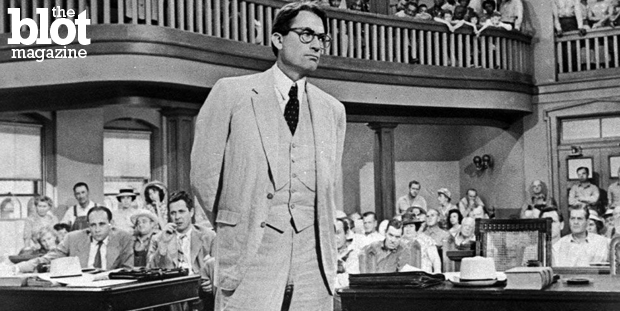
There’s no way to know what was in Harper Lee’s mind when she wrote “Go Set a Watchman.” Perhaps the novel was originally meant as a prequel or sequel to her world-famous “To Kill A Mockingbird” or maybe she was irked by the way many white people celebrated the nobility of Atticus Finch’s character. It’s quite possible the 89-year-old Alabamian wanted publisher HarperCollins to release “To Kill a Mockingbird” before “Watchman,” which was released July 14.
But most people who viewed Atticus Finch as a champion of social justice, a proponent of integration or staunch opponent to Southern segregation and the near 400-year mistreatment and subjugation of African-Americans were clearly wrong on several levels. An essay published more than 20 years ago makes that point expertly. The fact is, “To Kill A Mockingbird” was probably received the way people wanted to view the novel.
If it was a book criticizing the racial segregation of the South, the probity of a principled white man and the risks Finch took in the name of justice, then that is how it would be read by someone already convinced of those ideas. But it should be reminded that Scout’s protagonist father was a white man in a small Southern town who likely would have had very little reason to want integration to come to the idyllic village of Maycomb, which is modeled after Lee’s hometown of Monroeville, Ala.
The obscure essay now lives on by a mention in a New York Times piece, and the ideas are largely vindicated by Lee’s own words in “Go Set a Watchman.” Law professor Monroe Freedman wrote the essay in a trade publication meant for lawyers and pointed out that Finch didn’t zealously volunteer to defend Tom Robinson, a black man who was wrongly accused of raping a white woman: He was assigned the job and reluctantly accepted the duty.
In “To Kill A Mockingbird,” Lee wrote that Atticus Finch “hoped to get through life without a case of this kind,” never challenged blacks’ exclusion from the jury or that they were confined to the balcony of the courtroom. Sure, there were reasons for Finch to remain silent, regardless of what he felt in his heart — antagonizing the town or its customs could very well influence people to look down on him or Robinson — but it’s also possible he didn’t oppose Jim Crow because he was at least comfortable with segregation because that’s the way it had always been.
In addition, when an unruly mob attempts to abduct Robinson from jail so they can lynch him in the tradition of Southern militia justice, Finch makes excuses for the Ku Klux Klan by calling them only a “political organization.” He also basically excuses the head of the bloodthirsty mob out for their perverted version of racial justice as “basically a good man,” who sadly has “blind spots like the rest of us.”
I don’t think it would be a stretch today to say that comments like those would be viewed as at least inappropriate and blatantly showing signs of serious racially motivated bias and hatred. More broadly, Freedman used these passages to describe Finch as a “passive participant” in “pervasive injustice.”
Freedman was right on. It’s not just me — a coastal liberal — and some egghead lawyer with an axe to grind who thinks that. Noble laureate and the author of several classic novels that deal with race, Toni Morrison, said as much also.
In an early 2015 interview with The Associated Press (AP), she said that the book was a “white savior narrative” and “one of those” — sadly numerous in American history — in which the black experience of their own oppression and struggle for equal rights were reduced to the status of onlookers.
Only Lee knows for sure what the erstwhile Atticus Finch really was in her mind. But if “Go Set a Watchman” had been published first, he surely would never have become a role model on race. And that very easily could have happened.
Readers should try to remember that when and if they read the follow-up to “To Kill a Mockingbird.” Because it might have never been that Finch was admired so much. The situation could easily have been reversed, and today people would be applauding how much Atticus has changed because it would make them feel better that he was no longer a racist.
Be sure to check back next week when we post our review of “Go Set a Watchman.”
Noah Zuss is a reporter for TheBlot Magazine.





